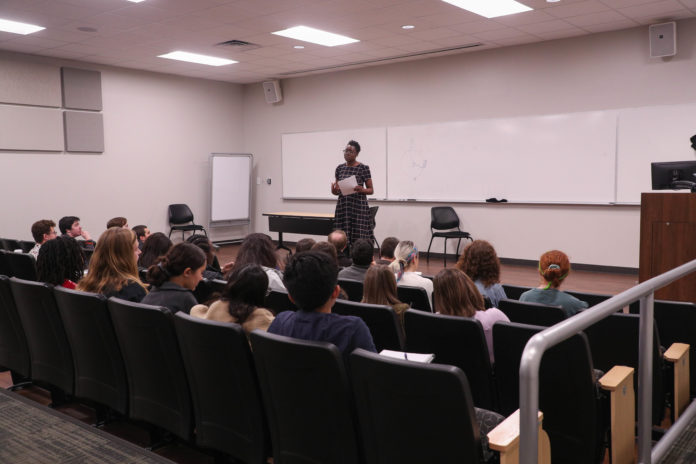
By Lucy Ruscitto | Staff Writer
Former Baylor professor Dr. Jacqueline-Bethel Mougoué returned to campus Thursday to speak about the closely related topics of nationalism and gender in Africa.
Mougoué’s first book was published by the University of Michigan in 2019, titled “Gender, Separatist Politics, and Embodied Nationalism in Cameroon.”
Mougoué is now a professor of University of Wisconsin Madison and centered her speech around a chapter from her book.
“The chapter really reflects how women’s everyday actions are often perceived by citizens and community members as an important ingredient in making developing and preserving ideas about national identity,” Mougoué said.
Mougoué said throughout her entire speech she planned to emphasize this point more than anything because she felt it was central not only to her talk, but to other countries with similar issues.
“In today’s talk, I will specifically place attention on nervousness and unease about women like me,” Mougoué said.
Mougoué was born in the nation of Cameroon, and prefaced some of the country’s history before going forward in her speech.
Mougoué said from the late 1800s to the mid 20th century, Cameroon in western Africa was under European rule, beginning with Germany, and eventually power over the country returned to France and Britain.
Cameroon gained complete independence in the 1960s, becoming the Federal Republic of Cameroon.
“But each state has its own government, laws, system of measurement, official language, their own social and financial system and they even drove on different sides of the road,” Mougoué said.
Mougoué said at the time when the two practically once-individual states merged, there was also a world-wide phenomena of radical societal changes around the world, where people challenged long-standing ideas of politics across the world.
“This was almost a revolutionary time for feminist movements to rise, as higher education for females began to be advocated for,” Mougoué said. “Women obtained white collar jobs, and even the fashion industry began to react.”
Mougoué said the initial women empowerment movement around the world, and in Cameroon specifically, led many women to redefine their self-image.
“As more and more women… joined the professional force, they started to do something really interesting,” Mougoué said. “They started to form images of themselves.”
Mougoué said this was when women decided they were on the road to freedom, and they began to revolutionize their look. Many women changed their outward appearances and the way they behaved to fit these newfound identities by incorporating what were considered “men’s clothes” at the time, such as slacks or trousers.
“What we have is an intimate, global connection between ideas about gender and national identity. The two cannot be separated at all,” Mougoué said.
Mougoué said this contributed to the subsequent societal divide between the traditional and the “spinsters” or “free women,” which were the more independent women grown out of the merged Cameroon were nicknamed.
When interviewing people from villages in Cameroon, Mougoué said the women were described as the sexually “loose,” hung out at the bars with the men, were unmarried and without children, smoked and most importantly — wore trousers.
“Prestigious membership-only private clubs were emphasized as spaces of good repute, and women in pants were seen as essentially tarnishing that image… [they] were accused on being non-African, and thus inviting critiques of a nation’s cultural values from the Western world,” Mougoué said.
Additionally, Mougoué said this “rebellion” of women led the the infamous Cameroon raids, in which the Cameroonian police force and government officials would point out any woman they believed to be a “spinster.”
After this designation, Mougoué said officials would exile a woman and about 10,000 others total, off to the “countryside.” This led to the downfall of clubs, banks, bars and more, many of which received most of their business from these “free women.”
“Really in the end, it was these women’s autonomy that really kept these towns alive, robust and economically healthy,” Mougoué said.
Dr. Ivy Hamerly, senior lecturer in political science and international studies program director, said she was grateful to have her colleague back at Baylor to inform students and staff alike on subject matter they aren’t normally exposed to due to the cancellation of the African Studies program.
“These are such interesting questions that I don’t have much training in,” Hamerly said. “[I don’t do] as much digging, I don’t have as many tools for analyzing cultural values, cultural identities and cultural questions that I can see… are really important.”
Both Mougoué and Hamerly were excited to have Mougoué speak again at Baylor, where Mougoué wrote her book and collaborated with many of her colleagues. Mougoué said she is also just excited to see her former students and coworkers.
Mougoué said she wants students that listened to her speech takeaway that one’s everyday choices are political, whether it be clothes or attitude. She also said that these issues of the presentation of a certain society’s women can be relevant and seen around the world, even here in Texas.
“It’s really about ‘How do we understand constructions of womanhood and constructions of manhood?’ And ‘How do each of these ideas connect to cultural values into national identity?’” Mougoué said.





